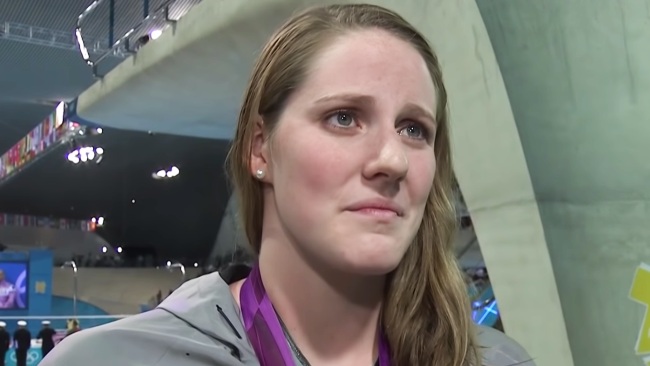During the 200-meter women’s backstroke final at the 2012 Summer Olympics, always-excitable NBC swimming analyst Rowdy Gaines couldn’t help himself when talking about Missy Franklin as she was in the process of winning gold and shattering a world record in the event.
“That’s the future of USA Swimming right there,” he said. “You’re looking at it.”
Gaines is often prone to hyperbole, but in a meet with Katie Ledecky and tons of other young talent, he reserved his highest praise for Franklin. And why wouldn’t he? Franklin won five medals in London, four of them gold, and set two world records in the process. She was 17, a bubbly young teenager who cried when she got to see her parents after races and smiled from ear to ear with her trademark pearls.
Franklin became a superstar in London, the latest in a long line of Olympians who take the world by storm. The Olympics have a habit of drawing us in, making us fully invested in the lives and success of athletes from every corner of the country who most people have never heard of prior to those two weeks. For that time, we as fans completely immerse ourselves in their story and in their success, ultimately filing away their names for an encore performance in four years.
Most Olympians don’t get an encore. They filter through the NBC promotional machine, share their heartwarming backstory, and make the rounds on the talk show circuit. But eventually they fade away, either because they choose to leave the sport behind or someone new takes their place, and the cycle starts anew.
That wasn’t supposed to happen to Missy. She genuinely dazzled in London. Franklin didn’t require any special hype — she shined on her own, showing remarkable grace and uncontainable excitement during what figured to be the first of many successes for her on the world stage. Swimmers routinely have long careers, and the women’s side was itching for someone to assume the mantle from Michael Phelps. Franklin had yet to hit her athletic prime, and her physical tools, combined with her lovable personality, made her an easy choice to become the future of USA Swimming.
I was stunned to hear that Missy Franklin retired from swimming last week at the age of 23. Admittedly, it had been some time since she had been at the top of her profession, but it’s hard to reconcile someone reaching the heights Franklin did and then never having another grand moment on the international stage.
All things considered, Franklin had an incredible career. She won 16 world championship medals, 11 of them gold, multiple NCAA titles at Cal, and still holds five world records. But her Olympic resume is mostly unchanged from six years ago. Franklin won an additional gold in Rio in 2016 on the 4x200m freestyle relay, but didn’t win any individual events after barely qualifying for Team USA. It was later revealed that she was diagnosed with depression and anxiety not long before Rio.
As it turned out, London would be the height of Missy’s career. That’s better than what most people achieve, but it doesn’t seem like enough for her.
While the rest of the world was gunning for the next great American swimmer at the 2013 World Championships, Franklin dominated, winning six golds in seven events, including one course record, one personal best, and one anchor-leg chase down to help the USA win the 4x200m freestyle relay. She wasn’t as outstanding in 2015, but she still left with a haul of five medals. Franklin had also just gone pro and the thought of her coming to the Olympics after a full year of training, without the time constraints of being a college student, was terrifying.
Rio was a letdown. It turned out 2016 wasn’t a triumphant return, it was a reminder of the frailty of success. Franklin was quite literally one of the best swimmers in the world, but she couldn’t seize the hearts and imaginations of people like she had four years prior. She had captured lightning in a bottle in London; maybe it was foolish to think she could uncork it again.
When I heard about her retirement, I thought a lot about Franklin’s lone gold medal from 2016. She swam in the preliminaries of that relay, and was supposed to swim in the final as well, but at the last moment was subbed out for Maya DiRado. At 23, DiRado was a first-time Olympian and had already announced her retirement following the Games so that she should take a consulting job. She had won three individual medals heading into the relay, including a gold in the 200m backstroke against a heavy favorite in what used to be Franklin’s premier event. Like Franklin four years ago, DiRado was experiencing her Olympic moment, and because of her impending retirement, there was no need for her to worry about what that meant for her future; her legacy existed in that week, in those four races, and DiRado crushed it.
Franklin didn’t get a killer last act. In the words of T.S. Eliot, she went out not with a bang, but with a whimper. She was supposed to achieve athletic immortality and live in the minds of Americans beyond the summer-length lifespan of the average Olympian but fell short.
Her career is a reminder of the fragility of the hopes and dreams we attach to Olympians because of the undue weight of a two-week stretch. Destiny is never clear cut. Missy Franklin wasn’t the future, but for a glorious eight days in London, she was the present. It was a beautiful moment, one that shouldn’t be forgotten.







